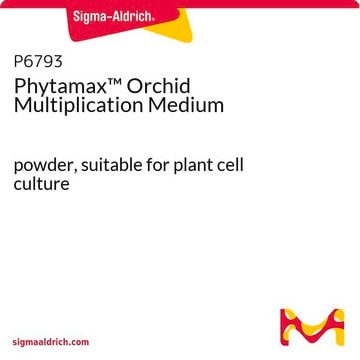M2909
Murashige and Skoog Modified Basal Salt Mixture
powder, suitable for plant cell culture
Synonyme(s) :
Murashige and Skoog Modified Basal Salt Mixture, w/o Ammonium Nitrate
About This Item
Produits recommandés
Forme
powder
Niveau de qualité
Technique(s)
cell culture | plant: suitable
Application(s)
agriculture
Température de stockage
2-8°C
Application
- to promote root development for internode stem suckers
- to promote shoot growth for the calluses
- for low nitrogen (LN) treatment, for the growth of Arabidopsis thaliana
Variante de formule
With the macro- and micronutrients described by Murashige and Skoog (1962).
Media Formulation
Notes préparatoires
Mention d'avertissement
Warning
Mentions de danger
Conseils de prudence
Classification des risques
Eye Irrit. 2 - Ox. Sol. 3
Code de la classe de stockage
5.1B - Oxidizing hazardous materials
Classe de danger pour l'eau (WGK)
WGK 2
Point d'éclair (°F)
Not applicable
Point d'éclair (°C)
Not applicable
Certificats d'analyse (COA)
Recherchez un Certificats d'analyse (COA) en saisissant le numéro de lot du produit. Les numéros de lot figurent sur l'étiquette du produit après les mots "Lot" ou "Batch".
Déjà en possession de ce produit ?
Retrouvez la documentation relative aux produits que vous avez récemment achetés dans la Bibliothèque de documents.
Les clients ont également consulté
Notre équipe de scientifiques dispose d'une expérience dans tous les secteurs de la recherche, notamment en sciences de la vie, science des matériaux, synthèse chimique, chromatographie, analyse et dans de nombreux autres domaines..
Contacter notre Service technique








